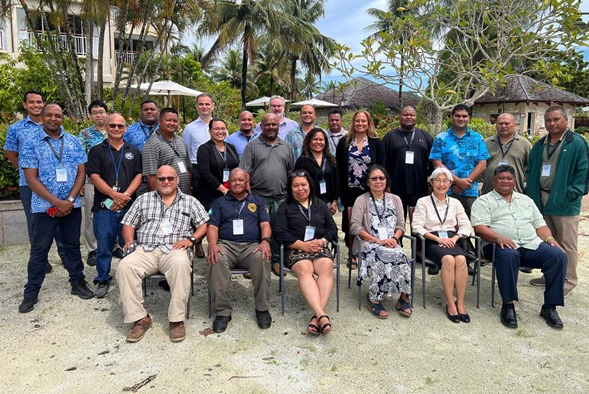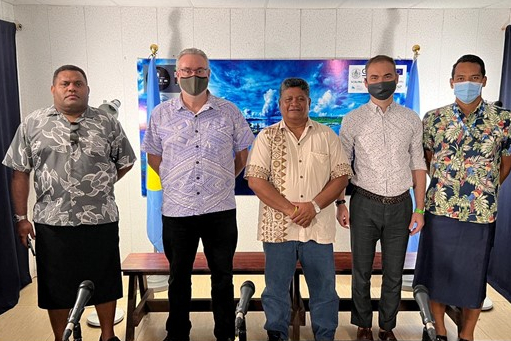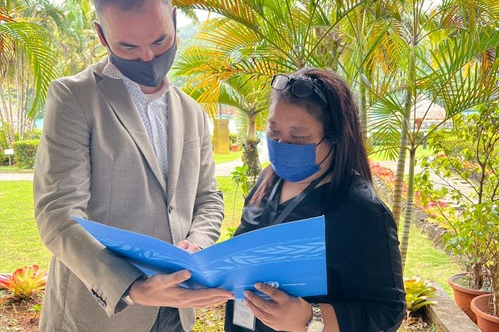Palau looks at improving border management
June 7, 2022
Koror, Palau – The Government of Palau has taken active steps to improve its service delivery, security and health requirements at the border after successfully completing its national consultation on integrated border management. The national consultative workshop on 25 - 26 May was organized by the United Nations Development Programme (UNDP) under the Pacific Integrated Border Management Project funded by the Government of Japan.
The consultation comes at a time when Palau has re-opened its borders and is preparing to manage an influx of visitors in a world post pandemic shutdown. The consultative platform brought together key stakeholders to share perspectives on project delivery and identify pathways moving forward through the identification of national priorities and management of COVID-19 in the re-opening of borders.
"Many hands make for lighter work" is one of the key messages made by the Minister of State, Hon. Gustav Aitaro as he challenged attending border management agencies to work together on "removing bottle necks and improve all areas of service delivery from immigration, security, customs and health."
The Minister of State went on further to stress on the importance of 'strengthening inter-agency partnership' as all departments play an integral role of protecting and securing Palau’s borders and its communities from future threats such as COVID-19.

Minister for State, Hon. Gustav Aitaro, Minister of State with representatives of the Government of Palau and UNDP staff.
Mr. John Tarkong, Director, Bureau of Customs and Border Protection is one of several members of Government that have been tasked with formalising a 'Coordinating Body' for border management in Palau. The initiative will be established through an executive order that will look at the authority and functions of the new body.
Director Tarkong added, "The Coordinating Body will strengthen existing working relationships amongst Customs, Immigration, Biosecurity, Bureau of Aviation, Palau National Aviation Authority as well as Maritime and Health, the Office of the Attorney-General and the Bureau of Public Safety. Essentially, the Coordinating Body will look at improving delivery of services, safety, and security of the travelers, streamline border processes, allocate resources and cost efficiencies at all levels."
An executive order will be issued which will empower agencies to streamline customs, immigration and biosecurity processes. This will allow for the efficient processing of passengers in a timely manner and will reduce long queues and unnecessary waiting periods at the airport. Undertaking this will not only enhance the experience of travelers but it will also mitigate the risk of transmission of COVID-19 at the border by allowing for free flow of processing.
The sharing of information, data and resources will be another key aspect of the executive order as it will allow for agencies to make informed decisions that are aligned towards joint policy and procedure for the integrated border management system in Palau.

Hon. Gusatv Aitaro, Minister of State, Government of Palau (middle) with UNDP representatives at the National Radio show.
The idea of establishing a Coordinating Body for border agencies received much support from key representatives in attendance. One of which was Ms. Sherilynn Madraisau, Director of Health and Human Services who played a critical role in advocating for the need of having a coordinated approach towards preparing Palau for all future health threats at the border. Palau boosts one of the highest percentages of double vaccination rates around the world with the Director being mindful of the need for the Bureau of Public Health to have a consistent role in border management as the country continues to build its capacity and resources on border health security.
The task does not end here as Palau will now need to, "...tailor its existing COVID-19 management plan to prepare for the next pandemic. What we’ve learnt is that we need to have the right protocols in place to prepare our communities for any threats at the border," said Director Sherilynn.
"The results of the two-day workshop could be distilled into five main prominent categories which are (i) creating platforms for regional and national cooperation, (ii) enabling environments for enhancing IBM, (iii) building capacities and understanding of IBM, (iv) establishing one source of truth for communications and (v) procurement of relevant hardware and equipment for advancing IBM. Overall, the five categories will help Palau in terms of pandemic preparedness for the future," explained Rustam Pulatov, Pacific Integrated Border Management Project Manager for UNDP Pacific Office in Fiji.

(L-R) Sherilynn Madraisau, Director of Public Health and Human Services with Mr. Rustam Pulatov, Pacific Integrated Border Management Project Manager.
Ms. Hagiwara Mayu, Chargé d'affaires ad interim of Japan stated, "Palau has been a leading country which is effectively managing border control since the pandemic." She expressed her optimism that Palau would accelerate its economic recovery and at the same time enhance public health and social security by integrated border management through this UNDP project funded by Japan.
"There is a sense of renewed energy in the border management space in Palau as stakeholders commit to working together to refine the finer details and workings of the executive order that will help formalize the 'marriage' between all agencies," said Director Tarkong.
Agencies hope to continue to build the momentum gained over the workshop by submitting and actioning joint national proposals that will seek to improve the ecosystem that is IBM.
Contact information:
Rustam Pulatov, Pacific Integrated Border Management Project Manager, UNDP Pacific Office in Fiji; email: rustam.pulatov@undp.org

 Locations
Locations



